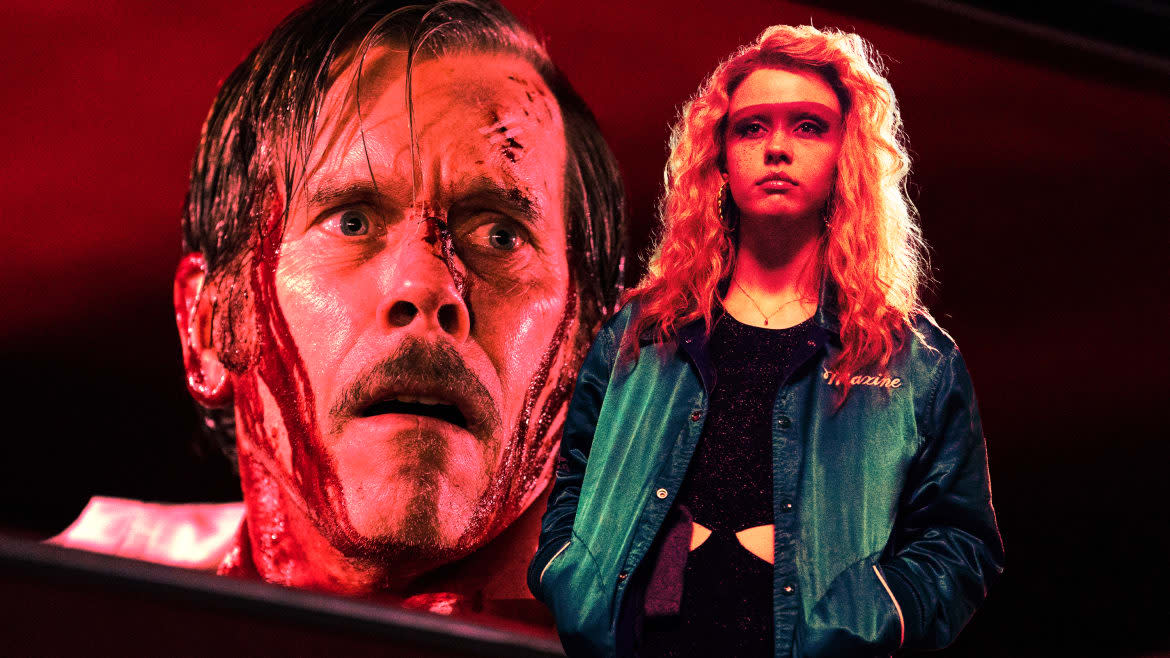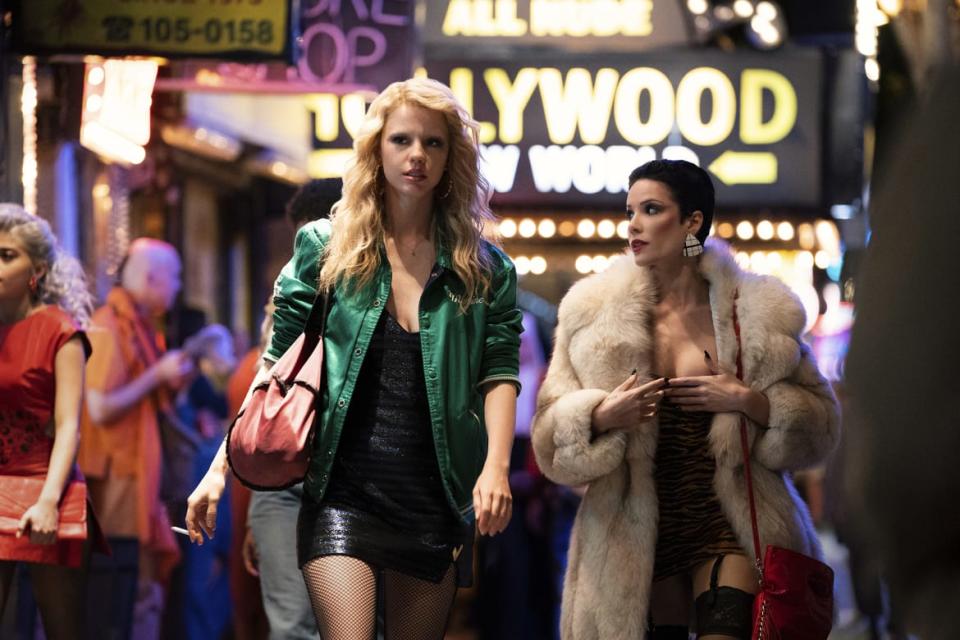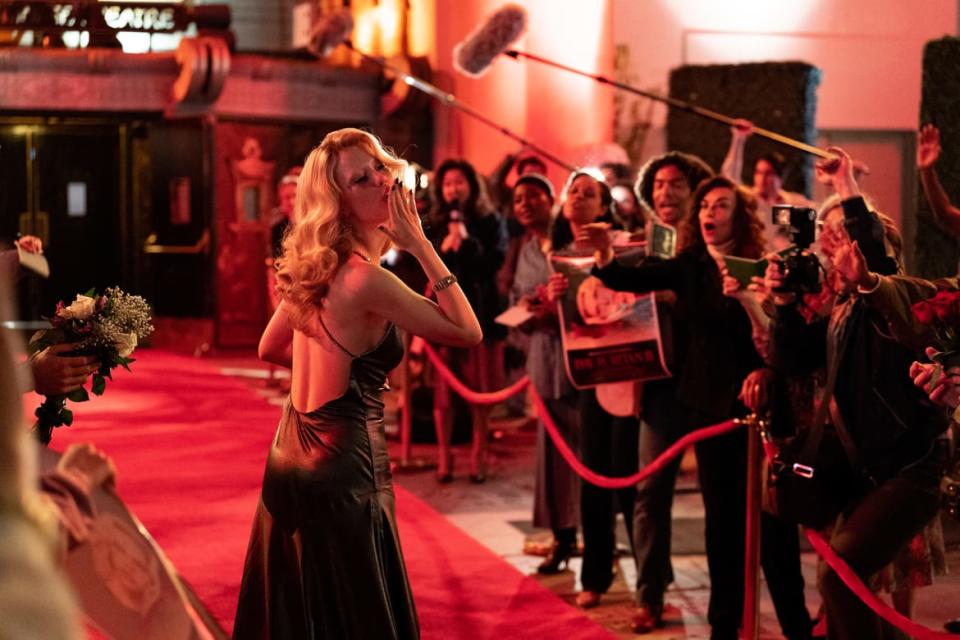‘MaXXXine’ Is a Bloody, Brilliant Capper to A24’s Iconic Trilogy

MaXXXine, the final film in Ti West’s bloody-brilliant X trilogy, has a lot riding on it. X was not only a smash success that made its $1 million budget back 15 times over, but it also drew a cult following of devoted fans, eager to watch the trilogy’s shining star Mia Goth slash, smash, and gnash her way through the franchise. Its prequel, Pearl—shot immediately after X in New Zealand during COVID-19 lockdowns, and kept secret until the first film’s release—made an even bigger splash. A smaller cast and more focused story made Goth that film’s undeniable star, and made Pearl the rare horror villain who was as iconic as she was sympathetic.
The success of the X trilogy’s first two installments has increased the weight of expectation on MaXXXine (which opens in theaters July 5), particularly since third films in a series don’t always land well. Happily, any foreboding inspired by the likes of Terminator 3: Rise of the Machines or Spider-Man 3 quickly dissipates once West and Goth settle back into their director-muse relationship.
A scuzzy tribute to grainy ’70s porno and slashers, X introduced us to Goth’s Maxine Minx, an aspiring superstar trying to use the burgeoning adult home video industry to launch her career, only to have her dreams destroyed by a murderous granny. With Pearl, West thrust audiences back into the Technicolor films of the 1930s to show us Grandma Pearl’s harrowing origins. And in MaXXXine, West finishes his story by catching up with Maxine six years after the events of X, which ended with its final girl peeling out from a farmhouse full of dead bodies straight toward Hollywood’s glowing limelight.
Like the previous two installments, MaXXXine is both a love letter to and a eulogy for a bygone era of cinema. This time around, West pays homage to the neon-soaked horror-thrillers of his youth. Goth is sensational once again, but more admirable are the ways that West and she rise to the challenge of the movie itself: MaXXXine is a much larger production than X or Pearl, and that broader scale occasionally hampers the film’s rhythm. But watching how West approaches his third read on genres of the past is exciting in and of itself. Both Maxine the character and MaXXXine the film are examinations of what happens when a woman who starts small explodes into the biggest thing she can be. The result is delightfully meta—the best, most incisive way that this trilogy could conclude.
MaXXXine opens with a winking quote attributed to revered and feared Bette Davis: “In this business, until you’re known as a monster, you’re not a star.” What appears to be an allusion to Maxine’s killer past is a much more clever sentiment, set up to affirm West’s storytelling prowess toward the film’s conclusion. Yet, by Davis’ thinking, there is no doubt that Maxine is ready to embrace her stardom. “I’ve seen the devil,” Maxine says, reading lines for an audition that she’s committed to memory so naturally that there’s no doubt she’s telling the truth. Right out the gate, Goth gives us a flash of the deeply felt scars she opened up for the blistering monologue in Pearl’s big finale. But in MaXXXine, these words are only lines from a script.

Mia Goth and Halsey.
Maxine is far more headstrong than Pearl. While Pearl was crippled by sexual repression, Maxine uses the libido that her televangelist preacher father tried to quash to her advantage. She makes her confidence clear to director Elizabeth Bender (an aloof Elizabeth Debicki), who hires Maxine for her first movie role in The Puritan II, a horror movie that she believes will make Maxine a star. That is, if the movie gets made. MaXXXine is set against 1980s Reagan-era moral anxieties about violence among American youth, and Satanic panic protests fill the studio backlots where Maxine is due to shoot, directly opposing a porn star making the transition to traditional cinema.
It’s no help that the Night Stalker—a real-life serial killer who terrorized Los Angeles in the 1980s—is lurking, making things even more dangerous for Maxine and her sex-worker friends. (Pop star Halsey’s bit part as a New Jersey-accented peep-show model named Tabby is far too short.) When a copycat killer pops up, embellishing victims with pentagrams, it appears that Maxine is the common link between the corpses, and our burgeoning starlet must finally come to terms with what happened at that little Texas farmhouse six years prior.
Eddie Murphy’s New ‘Beverly Hills Cop’ Is Funnier Than It Has Any Right to Be
For someone as stubborn and independent as Maxine Minx, that won’t be easy. “Do you know what happened to the last person that tried to kill me?” Maxine asks an assailant early in the film. “I crushed her fuckin’ head.” There’s a deadly price for crossing this heroine, and West gets some of his most outrageous violence into his last installment. In a franchise with wildly memorable and inventive kills and gore, MaXXXine finds fun, fresh ways to introduce bloodshed into the story. West is a writer-director who revels in excess, but his brutality is rarely senseless. When Maxine forces the aforementioned attacker to fellate her gun before giving his testicles a once-over, a closer read—beyond the cries of “OH MY GOD!” that ring out in the theater—implies her exhaustion with being seen merely as a sex object. Maxine demands that you see her as a serious actress.
That layer of gravity is always present, but West knows how to have fun, too. Whether he’s being cheeky by introducing us to Maxine’s agent, Teddy (Giancarlo Esposito), at the TNA agency (if you don’t get it, ask your parents), or making sure his thriller gets its obligatory chase scene, there is oodles of entertainment to be had here. West knows how to energize an audience, and he builds that energy out from stylish, dazzling single frames. His use of existing studio backlots, especially for that chase, is the consummate touch of a visionary director. And, as always, his reverence for genre films of the past stays expertly woven into the details. A gondola that leads up to a Hollywood Hills mansion is a direct reference to Brian De Palma’s Body Double, while the sex-worker-kidnapping psycho nods to Paul Schrader’s Hardcore and the lesser-known 1983 B-movie Angel.

Mia Goth.
It speaks to West’s flair for the meta that the biggest, most expensive film in his franchise is obsessed with the B-movies he adores. Elizabeth tells Maxine that she wants The Puritan II to be “a B-movie with A ideas,” just before she suggests that, if Maxine does well, it could be the defining role of her career. The very same could be said about West’s trilogy and Goth’s place within it. Goth, who has always done excellent work outside of her collaborations with West, is a major reason these films have soared in popularity. It’s her that viewers can’t get enough of; she has the “X” factor that Maxine is so obsessed with harnessing, a truly magnetic screen presence. MaXXXine is no different. Once the camera finds Goth, slack-jawed with Maxine’s Southern drawl dripping from her lips like molasses, it’s game over. You can’t take your eyes off her, and that’s exactly the fascination this character is supposed to evoke.
As interesting as it can be to dissect West’s meta touches, it’s easy to see where MaXXXine struggles where its predecessors did not. X and Pearl were small films with confined settings and tight, simple plots. But MaXXXine is set in the heart of Hollywood, far from the grassy farm where the first two films took place. What happens when you take that girl out of that limited environment? What would someone as determined-but-flawed as Pearl have encountered if she made it to Hollywood? Debicki’s character gives us an answer to chew on. “You’re in the belly of the beast,” Elizabeth says to Maxine. “The beast can spit you back out where you came from, and may never get a taste for you again.” Maxine, West, and Goth all take us on a crash course of the drive necessary to ride the entertainment industry instead of letting it crush you flat.
MaXXXine may be less intimate to its detriment, but it does such interesting things with its scale that the lack of closeness doesn’t matter. It’s small compared to most movies, but massive compared to West’s first two installments. Much like Maxine Minx, West had the chance to expand and show off his talents in ways he may not have ever imagined before X was released. It’s a brilliantly self-referential text that offers endless points of study and heaps of blood-soaked, femme fatale belligerence. The X trilogy is the supreme dream of film buffs and casual viewers alike, with MaXXXine its close-to-perfect conclusion.
Get the Daily Beast's biggest scoops and scandals delivered right to your inbox. Sign up now.
Stay informed and gain unlimited access to the Daily Beast's unmatched reporting. Subscribe now.

 Yahoo News
Yahoo News 
